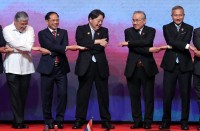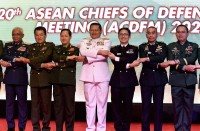
Chinese Foreign Minister Wang Yi pointed out the highlights of a series of foreign ministers’ meetings in the Philippines, approving of the consensus achieved in the prolonged South China Sea issue and expressing deep concern over the spiraling tensions on the Korean Peninsula.
From Sunday to Monday, Wang attended the ASEAN Foreign Ministers’ Meeting, the China-ASEAN Foreign Ministers’ Meeting, the ASEAN Plus
Three Foreign Ministers’ Meeting and the East Asia Summit Foreign Ministers’ Meeting.
At a press briefing on Monday, he underlined several focuses of the host of meetings on various issues besetting Asia.
According to the foreign minister, the most substantial progress was that China and ASEAN countries have pulled the South China Sea issue back to the track of negotiation and dialogue through joint efforts.
“From China’s perspective, the greatest progress of the series of meetings, or to say, the most practical development, is that we have stabilized the situation in the South China Sea thanks to the concerted efforts of China and ASEAN nations. We have conducted effective cooperation to bring the disputes over the conundrum back to the track where the parties directly involved can seek an appropriate solution through dialogue,” said Wang.
At the same time, the meetings also showcased a stark difference among the attending foreign ministers.
While countries off the South China Sea coast including China highly appreciate the positive development momentum of the situation over the perennial territorial contention, those outside the region still linger in the past, turning a blind eye to the sanguine changes, declining to acknowledge the precious achievements made by China and ASEAN and even releasing negative signals, said China’s Central Television (CCTV).
“We cannot help questioning whether some countries are unwilling to see a gradually stabilized South China Sea. Is such a scenario against their interests?” Wang asked.
The Democratic People’s Republic of Korea (DPRK) nuclear issue was also at the top of the agenda at the conferences.
Wang noted that China insists on realizing a nuclear-free Korean Peninsula through dialogue and negotiations.
He called on all parties involved to properly address the security concerns that lie in the core of the intractable plight, adding that China has proposed the idea of a “double suspension” to defuse the looming crisis.
The proposal, which was introduced in March, would see the DPRK suspend its nuclear and missile activities in exchange for the suspension of large-scale United States-South Korea military exercises, in an aim to defuse the looming crisis on the Korean Peninsula.
“This initiative will help halt the vicious cycle on the peninsula as well as find a breakthrough for the resumption of peaceful dialogue. We feel an increasing number of countries have started understanding and supporting this proposition and attaching importance to the roadmap laid out by China and Russia to peacefully solve the nuclear issue on the Korean Peninsula,” Wang told reporters.
(Courtesy China Central Television)








